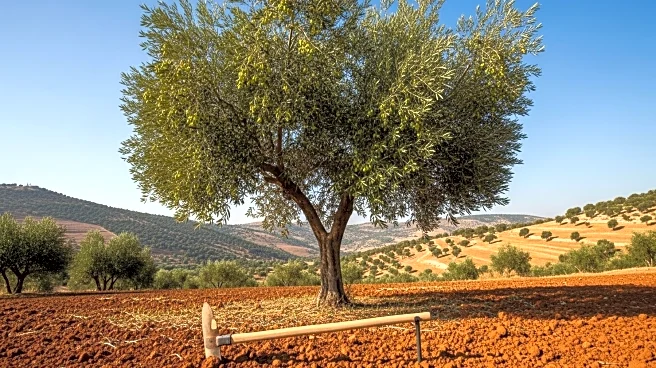What is the story about?
What's Happening?
The ongoing Israeli occupation of the West Bank has significantly affected Palestinian agriculture, leading to a decline in food sovereignty. Since the beginning of the year, Israeli soldiers and settlers have displaced thousands of Palestinians from their lands. This has been part of a broader pattern of annexation that has seen the destruction of seed banks, the uprooting of ancient olive trees, and the cutting off of water supplies. In the village of Al-Maleh, for instance, the local stream has dried up due to water being pumped by settlers, leaving residents reliant on water deliveries for basic needs. The agricultural sector's contribution to the West Bank's GDP has been declining since the occupation began in 1967, with small family farms, which make up over 70% of the farmland, being particularly affected.
Why It's Important?
The situation in the West Bank has broader implications for Palestinian society and the region's stability. The decline in agriculture not only affects the economic well-being of Palestinian families but also undermines their cultural and historical ties to the land. The loss of food sovereignty makes Palestinians more dependent on external aid and less resilient to economic and political pressures. This situation could exacerbate tensions between Israelis and Palestinians, potentially leading to further conflict. The international community's response to these developments could influence future peace negotiations and the region's geopolitical landscape.
What's Next?
The continuation of these practices by Israeli settlers and soldiers could lead to further displacement of Palestinian communities and a deeper economic crisis in the West Bank. International reactions, including potential diplomatic interventions or sanctions, could play a role in addressing these issues. Palestinian leaders may seek to bring more attention to these challenges in international forums, hoping to garner support for their cause. The situation remains fluid, with potential for both escalation and resolution depending on actions taken by both local and international stakeholders.
Beyond the Headlines
The ethical implications of the Israeli occupation and its impact on Palestinian agriculture raise questions about human rights and international law. The destruction of agricultural resources and the displacement of communities challenge the principles of self-determination and sovereignty. Long-term, these actions could lead to significant demographic and cultural shifts in the region, altering the historical landscape of Palestinian territories. The preservation of cultural heritage and the rights of indigenous populations remain critical issues in this context.


















